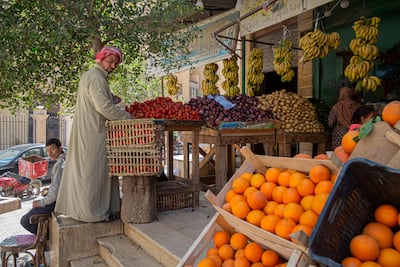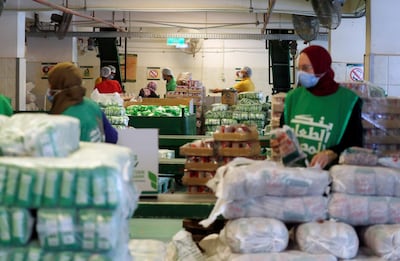Egypt has enough stockpiles of most essential food, including wheat, to meet consumption for at least the next six to nine months, two cabinet ministers said on Thursday.
At a ceremony marking the start of the wheat harvest at a farming development in southern Egypt, the agriculture and supply ministers sought to reassure the country’s 103 million people as they struggle to make ends meet in the face of a steep rise in local food prices.
“The Egyptian state is capable of achieving food security for its glorious people,” declared Agriculture Minister El Sayed El Quseir at the televised ceremony attended by President Abdel Fattah El Sisi.
Soaring food prices are partially the result of the Ukraine-Russia war — the two countries provided about 80 per cent of Egypt’s wheat imports, which stood at about 13 million tonnes in 2021 — as well as rising fuel and shipping costs and the disruption to the global supply chain following the Covid-19 pandemic.
The crop is a strategic commodity in Egypt, the world’s largest wheat importer, where the government every day provides 71 million with subsidised bread to the tune of 270 million loaves of the local flat variety. The remainder of Egyptians rely on a more expensive and larger variety of the traditional flat loaf. The government stepped in to fix its price last month after it rose by 50 per cent.

Since Russia’s invasion of Ukraine in February, Egypt has taken measures to soften the impact of the conflict. It has banned the export of key foodstuffs, including wheat and cooking oil.
Faced with a flight of foreign currency in response to the uncertainty created by the conflict, Egypt has also devalued its currency by nearly 15 per cent against the US dollar, raised interest rates and engaged the International Monetary Fund in consultations that could yield a new reform programme and a standby loan from the Washington-based lender.
Egypt’s Gulf Arab allies, meanwhile, have poured in billions of dollars in investments and central bank deposits to bolster the country’s ability to withstand the pressure of its latest economic crisis.
On Thursday, Supply Minister Ali Muselhi said Egypt had 2.6 million tonnes of imported wheat in storage to which it will add 6 million tonnes to be procured from farmers by the end of the harvest season in June. The total harvest was expected to reach 10 million tonnes, he said.

“These amounts will meet our demand until January 2023,” he said. A $1.8 billion investment in the construction and improvement of existing silos in 2016 has enabled Egypt to withstand the disruption of wheat supplies from Russia and Ukraine, he added.
Mr El Quseir said Egypt this year grew a total of 2.6 million acres with wheat, an increase of 250,000 acres from 2021 and 450,000 acres from the previous year.
He said Egypt was looking into importing wheat from 22 “sources” following the disruption of supplies from Russia and Ukraine. He did not elaborate, but Egypt last week said it has cleared India as a new supplier after technical consultations between experts from the two nations.
He said a package of measures was put in place to ensure that local growers met the government’s target of 6 million tonnes of local wheat. These include paying the growers in cash within 48 hours of delivery and banning the transfer of wheat without official permission throughout the harvest season. The centres which growers deliver their wheat to were increased to 450 nationwide, he said.
Expanding and improving the productivity of the agricultural sector has been a priority for President El Sisi since he came to office in 2014, but rapid population growth — more than 2 per cent a year — has meant Egypt needs to import large amounts of essential foodstuffs.
Mr Muselhi said Egypt currently produced 75 per cent of the sugar it consumes but that would rise to 90 per cent in 2023. It is totally self-sufficient in rice but has a 40 per cent gap between consumption and production of red meat.
“Cooking oil is a real challenge,” he said, explaining that Egypt produced 42 per cent of what it consumes, including the use of imported seeds. The remainder, he said, is imported.
As well as cheap bread, the 71 million Egyptians covered by subsidised food cards also receive a range of goods, including cooking oil, pasta and sugar.
Successive governments over the last half a century have been at pains to keep subsidised bread affordable, but have sought to lower the cost by reducing its size and expelling millions deemed able to afford to buy food at market prices from the card system.

